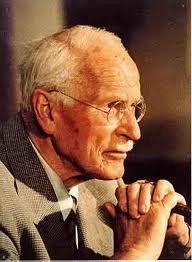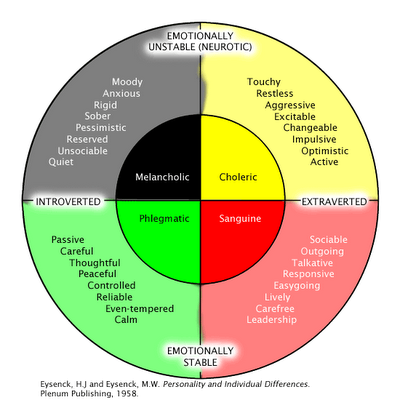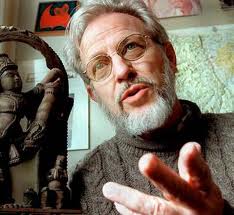Conversations with the Dead People - Professors Eysenck vs Jung

My book, Ghost Guidance & Automatic Writing.
Welcome to Conversations with Dead People - Professors Eysenck and Jung.
Continuing on with my new series, taken from my book Ghost Guidance & Automatic Writing. Here is a piece received from an entity claiming to be the world-famous Professor Carl Gustav Jung. I no longer doubt his authenticity. But which part of him is it? From whence cometh such a message? But I’ve asked these sorts of questions ad neuseum. Here is the recorded conversation.
On the 4th of October a man who had contacted me several times previously was back.
Before commencing my guide, Jerry Ames, said that he anticipated a really good session as conditions were exceptionally good. How he could ascertain this I don’t know. But here’s how it went.
"The conscience is inherent in every human being."
“Good day, Mr. Ware. I have spoken to you before on several occasions. Yes. Carl Gustav Jung here. Yes. And you are still insisting on writing my name out in full, as you used to.
“I was most interested in your reading of Mr. Eynsenkt (spelling could be incorrect) You’ve spelled his name wrong, but it is irrelevant. Mr Eynsenkt and I fail to agree on a great number of points, Tom. He believes that the conscience- Mankind’s greatest inner directive- can be conditioned. I believe that it can be manipulated, but such manipulation has an adverse effect upon the human organism as a whole.
“The conscience is inherent in every human being. Some choose to ignore its dictates more than others; in some it is not strong. But it is always there.
Professor Carl Gustav Jung

"Reasoning can be conditioned."
“Reasoning can be conditioned. Here, Mr. Eysenkt and myself are very much in agreement. But reasoning -the conscious and subconscious is not conscience, though at times -particularly in such experiments as mentioned in Eysenkt’s book, where animals are involved- it might appear to be so.
“Mr. Ware. I ask you to consider this hypothetical situation. If a man were going to rob another, do you think he could be talked out of it by an appeal to his conscience? The answer has to be yes. He could -if the appeal to his conscience (Yes, an appeal to his better emotions, if you like. But I would like to point out that emotions are not causal; they are the after-effect of an appeal to something greater) If you appeal to the better, more moral things in the would-be robber, then chances are that you would be able to get him to change his mind. In this particular instance, and perhaps even in those temptations that might arise in the future.
"Now let us consider it from Professor Eysenck's viewpoint."
“Now, let us consider it from Professor Eynsenkt’s viewpoint, that is: conscience is a conditioned thing. If the robber could be swayed from robbing, then also a good (moral) person could be conditioned to rob.
“We are dealing with children here. The conditioning having been done in the human child. Now. Have you ever seen a child talked into committing a wrong. It goes against the grain with them right from the outset. They are not being conditioned from a neutral point of view. They are being conditioned from an inherent inner conscience.
“I will give you a few examples to prove my point.
One: Take the case of the little boy who knows that if he steals from his mother’s purse, he can purchase the sweets he wants. He steals. His mother never finds him out. He steals again. Again his mother never finds him out. It is reasonable, then, to assume, if we consider Eynsenkt’s hypothesis, that this success will act as an encouragement in more stealings of the same nature. And it usually does so. But what happens when he begins to learn that it is immoral to steal? That is, he is told, perhaps by a teacher who knows nothing of his stealing, that it is wrong to steal?
Personality and Individual Differences - Eysenck

"But what in effect does happen?"
“Now, if his conscience can be conditioned, then one could logically assume that, because of his earlier successes and his immediate rewards, he would be all but unconditional to make amends. Remember that his teacher has used no rewards or punishments. All she has done was to read him a story which spelled out a certain morality, i.e. that it is unworthy of human behaviour for one person to steal from another.
“Now. If we are to go along with the postulates of Professor Eynsenkt, it should follow that one story by a teacher would have little effect on the behaviour of the child who has successfully stolen on repeated occasions- and has had immediate and gratifying rewards on every occasion. But what, in effect, does happen? And happens on a great many occasions?
“I will tell you what happens. The child is immediately subject to mental stress. There is conflict. One adult says that he should not steal. His own experience has told him that stealing can be a very rewarding pastime. Does he trust his own experience?
He knows he has enjoyed the fruits of stealing - and yet very often give it up.
“He does. He knows that he has enjoyed the fruits of stealing- and yet he very often gives it up. He gives it up so that he can achieve peace of mind. It is easier to forego the pleasures of eating stolen sweets than it is to face up to the dictates of a conscience that has been aroused -yes, aroused, not implanted; for one story about somebody else is hardly enough to implant a new and completely differently oriented conscience. He gives it up because the conscience was always within him. He knew, even when he was stealing, that he should not do so. And if he was to go on and never ever hear a moral story advocating that he should not steal, he would always feel a little uneasy about it.
“Now it could be argued that he would feel uneasy about it because of his conditioning- the very subtle conditioning of the society in which he lives. And this would be a valid argument. But if it were only this, why would it have such an effect on a boy who -according to Eynsenkt’s theories- has been receiving the pleasures of eating the fruits of his thieving?
A mandela of the sort which so fascianted Professor Jung.

"If Mr. (Professor) Eysenck were right..."
“If Mr Eynsenkt were right, then every act of immorality or dishonesty that is gratified would go towards reinforcing a conscience that was strong for that type of success. The man who gets away with adultery, for instance, would feel (because his pleasurable rewards are immediate) that he has no reason to feel guilty. The act of infidelity would colour his conscience to where he thinks it is good to be morally unfaithful.
“I will try to explain this again. We have come close to what I am trying to achieve, but not as close as I wish.
“We will deal specifically with the case of sexual conscience. Take the case of a man who is unfaithful to his wife. It is a common enough occurrence.
It is an offence against our conscience to be unfaithful.
“In our western society it is an offence against our conscience to be unfaithful to our wives. This is a conditioned reflex. We are told we should not be. We are told through the gentle conditioning of stories- where infidelity fails. We are told by our religious guides, priests, clergymen, etc.. It is brought home to us by Law. All this conditioning adds up to a fairly impressive conglomerate to not be unfaithful. Why, then, do such a large percentage go against the dictates of such conditioning?
“Professor Eynsenkt would have us believe that this is because the punishment and the rewards are not immediate. That as children, sexual promiscuity, adultery and the like, were abstract quantities; things we really know nothing about.
Professor Hans Eysenck belaboring a point.

"Now the biological urge for sex is a very strong one."
“Now, I ask you, if that were so, one would assume -on Professor Eynsenkt’s earlier statements (there being no immediate reward or punishment) that children grow up with a relatively neutral attitude towards infidelity. If Eynsenkt were right then, due to gentle conditioning (conditioning without immediate reward, or immediate punishment) there would be just a slight bias against infidelity And this would seem to be the case.
“Now the biological urge of sex is a very strong one. Therefor it is easy to see how a little rationalisation could cause that same child -who is now an adult- to turn a blind eye to the very gentle, and rather ineffectual abstract conditioning of his childhood. In a modern society such as ours he has the opportunity, the stimulus, and not too much stigma against his carrying out his amoral acts. So he carries them out.
"So far in all this it would seem Mr. Eysenck is correct...but let us examine further."
“So far, then, in all of this, it would appear that Mr Eynsenkt is correct. There has been no immediate punishment, and no immediate reward in childhood: therefore, on the surface there is no strong feelings of guilt or remorse. In fact, the opposite feelings should prevail (because the rewards - in adulthood- and in the act of infidelity are immediate) the conscience should form along lines where it is deemed satisfying to the conscience to be unfaithful (Unfaithful might be an inappropriate or coloured word here- a better one might be ‘promiscuous’) To get back. It should be satisfactory to the conscience that promiscuity is moral: good: for the rewards have been immediate.
Let us assume that a given adult, our subject, has been raised in an environment where he has been conditioned without immediate reward or immediate punishment, to believe that infidelity is wrong. On reaching adulthood he marries. Let us assume that he puts little heart into the marriage vows of faithfulness. In other words, he makes no personal vow. He then takes up with another woman. He might be a sailor, or one who travels the world and who is often away from his wife.
“On returning home he finds that he is impotent, unable to have relations with his wife.
"According to Eysenck there should be no guilt."
“On the surface of it there seems to be no reason for this. And yet -psychiatric processes reveal that he has an inner guilt that renders him psychologically impotent. The immediate question is one of whether or not the patient has subconscious guilt. And oftimes it turns out that he does. Why?
“According to Professor Eynsenkt there should be no guilt. On the contrary, if it were possible to find a word which would fit, he should have the opposite feelings to guilt. (We cannot use the word ‘innocent’ here, because of its different shades of meaning) He should feel no subconscious remorse. None at all. Because his pleasurable rewards in acts of unfaithfulness have been immediate and gratifying.
"A check of the facts will reveal that he does indeed suffer guilt."
“But a check of the facts will reveal that he does indeed suffer guilt. And when he admits to that guilt, accepts himself as being responsible for -what to him- is a reprehensible act, he is often on his way to a cure.
“Now, why should he admit to a reprehensible and immoral act when his conscience has been conditioned- according to Eynsenkt and his immediate reward theory- that he has done no wrong?
“ I would like to give one more example where I think the good Professor Eynsenkt is wrong. I will make it brief.
“Take the case of a man who commits a murder. Now, murder has always been regarded as a crime against humanity: provided it is the taking of a life from within the society where that person lives (We discount war here) A man who murders knows that he does wrong. He knows it not only because of the revulsion of his fellows. He knows it inherently.

"And yet these same people suffer mental agonies."
“Now, if he were a strong man, and in the position whereby he dominated a group of people, and knew that he could not be touched, i.e. punished, then, according to Eysenkt, because of his immediate reward of having killed someone who he hated or feared, then he would be filled with an immediate pleasure or satisfaction or relief. This would be his immediate reward. Now, in you study human nature, you will know that on the conscious level this is often what happens. Murderers, say, in the environment of a concentration camp, become sadists. They derive pleasure from killing others. And their pleasure is immediate.
“And yet these same people suffer mental agonies. They suffer generally at levels of subconsciousness that they do not understand. They might have no religious belief whatsoever. They might never have been given any religious instruction. And yet they suffer from an inherent torment because of something they cannot understand.
"Yet he is frightened to think too deeply about what he is doing."
“Eynsenkt might say that they are going against the conditioned gentleness that they received as infants. A seemingly valid argument. The fond arms of the nursing mother, the warm breasts, are all very pleasant. But these things are unearned. These things are unconsidered. They are not rewards for being good. So- if we go along with Professor Eynsenkt- we should ignore them. They do not- according to Eynsenkt- have anything to do with the conditioning of conscience.
“But to return to our sadist.
“He has murdered many. His conscience does not worry him. Yet he is frightened to think too deeply about what he is doing. He acts largely under a compulsion he cannot understand. And he sleeps badly.
"Analysis shows this to be quite different."
If he had been conditioned on the lines laid down by Professor Eynsenkt he would enjoy killing both at the conscious and unconscious levels of his being. There would be no conflict in him. Analysis shows this to be quite different. Analysis shows that the murderer, particularly the wilful murderer, suffers terribly from deep and well-rooted guilt complexes. He does not know why. Analysis reveals that there is inherent consciousness for good in the human being, and that if that goodness is thwarted then the human being suffers.
“But that is enough for today. Your good guide, U.R., tells me that this has been sufficient for one day. Goodbye, Mr. Ware. It was nice to make your acquaintance with you again. Goodbye.”

“This is Jerry. Yes. That was Professor Jung. He is still listening in. I will put U.R. on now.”
“U.R., here, Tom. An excellent session. Mr. Jung is pleased with the result although, naturally, he would have liked even more accuracy. Still, you did your best, and no one can do better than that.
“Conditions have been good. Still are. Though you are tiring now. I will go with just this little bit of advice.
“Keep up the practice. You’ll get enough information for the book you- and we- desire to have published. You can then live to see that what we have given you will be of use to your people, your world. You will help to start a revolution in thinking. And when you finally arrive here, you will know that you have done the right thing. As Professor Jung would put it: your consciousness will be in accordance with that part of you that we describe as the inner soul. Goodbye.
“Professor Jung wishes to say more but I must refuse him. Goodbye, Tom.”





